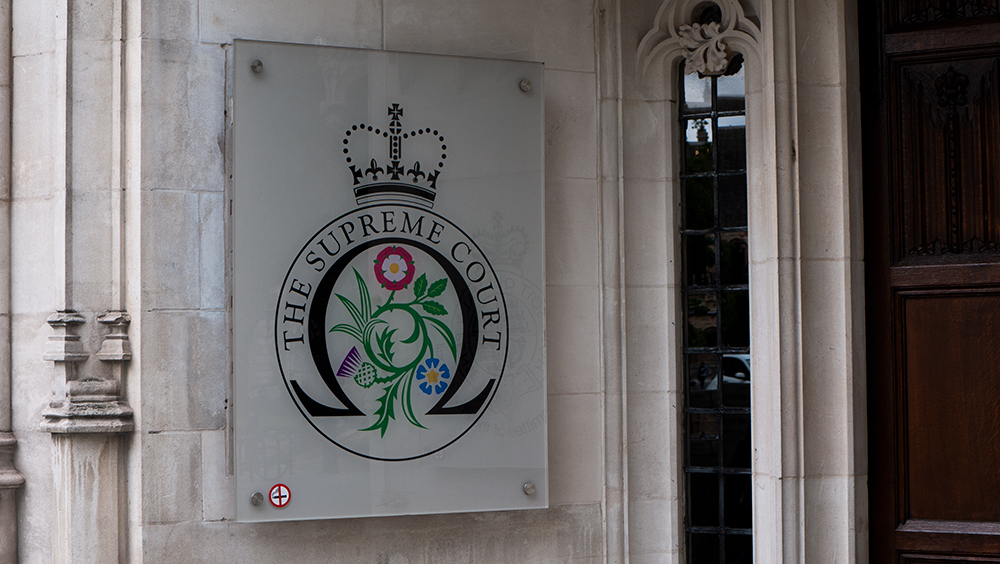UKSC: PSNI decision to end investigation into Hooded Men torture was unlawful and ‘lacked professionalism’

The UK Supreme Court has ruled that a Police Service of Northern Ireland (PSNI) decision in 2014 to terminate an investigation into allegations of torture against the “Hooded Men” was unlawful.

About this case:
- Citation:[2021] UKSC 55
- Judgment:
- Court:UK Supreme Court
- Judge:Lord Hodge
The PSNI brought the case to the UK’s highest court, having been unsuccessful in the Court of Appeal to overturn a High Court ruling in light of unearthed evidence relating to UK government knowledge of the practice.
Background
These appeals from the Court of Appeal in Northern Ireland both related to events which occurred during the Troubles.
One appeal related to the death by shooting of Ms Jean Smyth on 8 June 1972. The other appeal related to the very serious ill-treatment by the Royal Ulster Constabulary (RUC) in August 1971 of people who were detained by the security forces for interrogation. Fourteen men, who have become known as the Hooded Men and who included Francis McGuigan and Séan McKenna, were subjected to this unacceptable treatment.
Mr McGuigan and Mary McKenna, the daughter of the late Séan McKenna, sought judicial review of the decision made by the PSNI that there was no evidence to warrant an investigation, compliant with articles 2 and 3 of the European Convention on Human Rights, into the allegation that the UK government authorised and used torture in Northern Ireland in the case of the Hooded Men.
During a RUC seminar in April 1971, training was provided by officers of the British Military Intelligence Centre to the RUC which included five interrogation techniques which had been used in British colonies: (i) wall-standing; (ii) hooding; (iii) subjection to noise; (iv) deprivation of sleep; and (v) deprivation of food and drink.
Ireland v United Kingdom
On 16 December 1971, the government of Ireland submitted an inter-State application to the European Commission of Human Rights against the United Kingdom contending that persons detained in Northern Ireland, including the Hooded Men, had been subjected to treatment in breach of article 3 of the Convention, and that the treatment had been an administrative practice of the State and a continued series of executive acts which had exposed a section or sections of the population to torture or inhuman and degrading treatment.
The Irish government requested that the case should be referred to the European Court of Human Rights in order to affirm the decision of the Commission. The Irish government requested that the Court make two consequential orders against the United Kingdom: first, an order that it refrain from reintroducing the five techniques as a method of interrogation or otherwise; and secondly, that criminal or disciplinary proceedings be undertaken against members of the security forces who had perpetrated, condoned or tolerated the breaches of article 3 found by the Commission.
The first request was withdrawn following a solemn undertaking given by the UK government on 8 February 1977 that the five techniques would not in any circumstances be reintroduced as an aid to interrogation. The second request was maintained.
The Strasbourg Court handed down its judgment on 18 January 1978: Ireland v United Kingdom (1979-80) 2 EHRR 25. The court agreed with the Commission that the combined use of the five techniques amounted to “inhuman and degrading treatment” contrary to article 3 but the majority found that they did not amount to torture.
In 2003, UK government documents relating to the matter began to be deposited at the UK National Archives at Kew, pursuant to the 30-year rule. These indicated that “there are various papers that show that ministers and senior officials were indeed aware of the interrogation methods being used”. An RTÉ documentary was released, which further investigated these claims. However, on 17 October 2014, the PSNI made a decision not to investigate this new information further.
In 2015, Mr McGuigan and Ms McKenna applied to the High Court in Northern Ireland for judicial review of decisions taken by the authorities in the light of the RTÉ documentary.
In the High Court, Mr Justice Maguire concluded that the PSNI’s decision not to investigate further whether the British government had authorised the use of torture in Northern Ireland was unreasonable or the product of a legal misdirection. This approach was upheld on appeal to the Northern Ireland Court of Appeal. The PSNI appealed this decision.
Supreme Court
Delivering his judgment, Lord Hodge referred to the RTÉ documentary, which made reference to a British government memorandum, known as the “Rees Memo”, which “referred to the use of torture and to its approval by UK ministers”.
“The court finds that the PSNI’s decision taken on 17 October 2014 not to investigate further the allegation in the Rees Memo was based on a seriously flawed report, was therefore irrational, and falls to be quashed,” the court said.
The court noted that the investigation into this new evidence was “unreasonably narrow”. The investigating officer interpreted his task as being to see whether there were documents on file which used the word “torture” in conjunction with the UK government. The court said that “to expect the authorisation of torture to be described so explicitly, however, is both unrealistic and a misdirection”.
Following on from this logic, to conclude that, because he had not come across other documents which described the use of the five techniques as “torture”, it was “abundantly clear that the use of torture was never authorised at any level and that there is absolutely no documentation which suggests that it was” was naïve. Whether torture was authorised could not on any rational view depend on whether the word “torture” was used in these documents.
The court also accepted that the report showed on its face a lack of fairness in the officer’s approach and a willingness to base conclusions on partisan assumptions rather than evidence, which included the fact that the officer never actually watched the RTÉ documentary which was central to the report, and merely made assumptions about the evidence it contained. The court argued that “such a lack of professionalism and impartiality discredited the work done”.
The decision taken by the PSNI on the basis of such a seriously flawed report was irrational and should not be allowed to stand.
Conclusion
In relation to the Hooded Men, the court found that the PSNI was not under an obligation to investigate the authorisation of the ill-treatment of the Hooded Men under article 3 of the Convention.
However, the decision taken in 2014 not to investigate the allegation in the Rees Memo was based on a seriously flawed report, was therefore irrational, and fell to be quashed.
The court ultimately allowed the appeals by the Chief Constable for Northern Ireland, the Secretary of State for Northern Ireland and the Northern Ireland Department of Justice, recalled the orders of the courts below, upheld the decision of Mr Justice Maguire and the majority of the Court of Appeal to quash the decision taken on 17 October 2014, but otherwise dismissed the applications for judicial review.










